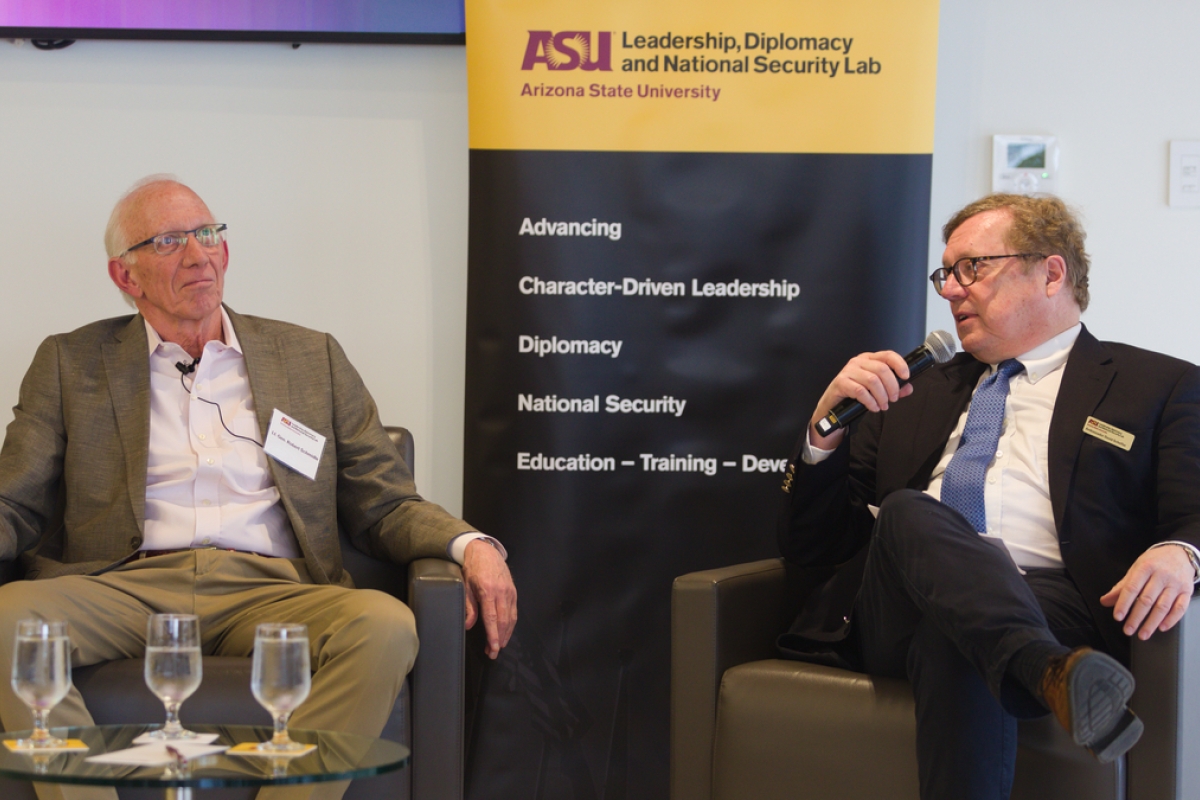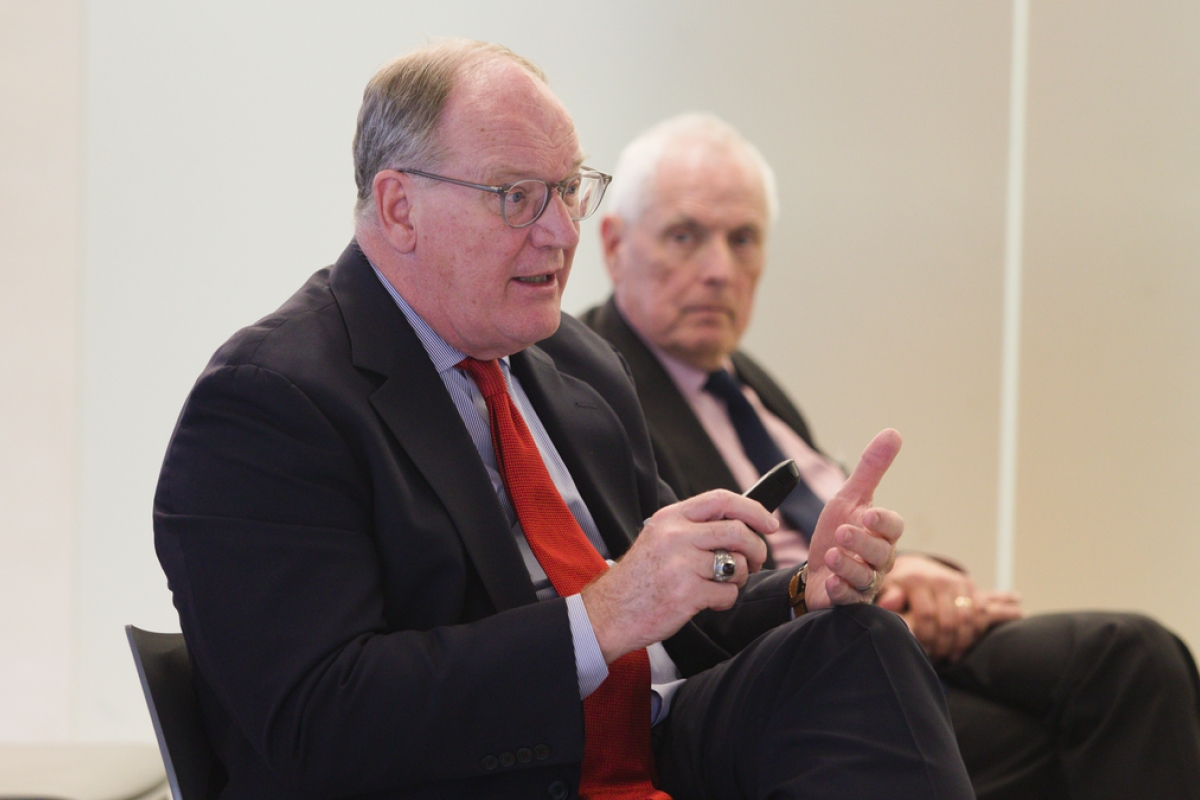ASU lab hosts discussion on cyber defense as a deterrent

Lieutenant Generals Robert Schmidle and Ben Freakley discuss how a comprehensive cyber deterrence approach should include economic, diplomatic, and technological elements. Photo courtesy Hager Sharp
The Leadership, Democracy, and National Security Lab invited retired Lieutenant General Robert Schmidle Jr., the former deputy commander of U.S. Cyber Command, to speak about the strategic imperative of cyber defense as a deterrent for U.S. national security and its future applications in a turbulent world.
Lieutenant General Benjamin C. Freakley, a co-founder of the lab with Ambassador David Scheffer, facilitated the third discussion of the continuing series on “Creating a Strategy for 21st-Century Deterrence” at the Barrett and O'Connor Washington Center in early April.
Lt. General Schmidle, whose doctoral dissertation was on the power of context and shaping moral choices, spoke on how cyber deterrence is not a strategic or technical concept, but rather applied psychology.
“We are trying to focus on an adversary — on a person — not necessarily on a country,” said Schmidle, a professor of practice and a university advisor on cyber capabilities and conflict studies at ASU. “Things don’t deter people. People kind of deter people, and we don’t deter through the things that we say, we deter through the things that we do.”
However, the point was also made that governments must determine the kinds of incentives and “costs” that will impose the greatest hardship and best coerce adversaries, and be persistent in following through on their deterrence efforts.
To home in on shaping an adversary’s behavior, Lt. General Schmidle emphasized two approaches to deterrence: One is to compel adversaries to take the desired action on their own, and two is to coerce the adversary to do something by force or threat. He shares an example of China:
“Today, the Chinese are executing a strategy that we refer to as 'fait accompli' strategy. They'll occupy some rock in the South China Sea, and they'll put soldiers on it. They'll build an airfield, and they're betting — and so far, they've been right — that we, the U.S., will not take the level of risk necessary to push them off that rock,” Lt. General Schmidle said. “They (China) have actually compelled us to do what they want us to do without having to coerce us and have a direct military confrontation.”
When it comes to the world of cybersecurity, Schmidle said the notion of having an integrated deterrence is only valuable if you understand who it is you’re trying to deter and what behavior you want the adversaries to exhibit. He explained that adversaries won’t see it that way and recalled the cyberattacks by North Korea on Sony Pictures back in 2014.
“I sort of opined that ‘Well, wait a minute … when did we, the U.S., declare that our motion picture industry was part of our critical infrastructure?’ Until then, it wasn’t, but it became part of it shortly after because there was a lot of money involved,” he added, noting that nothing happened to the North Koreans as a result of their attack on Sony. “If you are going to try and deter in the world of cyber, as a broader deterrence strategy, you have to be prepared to take action against people who don’t abide by that.”
The 2021 national security strategy for cyber deterrence called for persistent engagement, meaning a continuous pursuit of an adversary to defend our own networks. Deterrence has since evolved to an integrated approach that is now “engaged forward,” meaning deterring adversaries by stopping them before they start.
The discussion was followed by a Q&A led by Scheffer with questions from the session’s attendees and virtual audience. During the Q&A, Schmidle addressed the vulnerabilities that come when working with partners and allies.
“The extent to which our networks are resilient does, I think, have a very big part to play in an overall deterrent strategy,” Schmidle said, as he recalled the takedown of SIPRNet, the Pentagon’s secret internal network, which was infiltrated by a USB drive back in 2008. “There are other countries that we very much want to have closer relationships with, but their level of cybersecurity might not be such that we would be comfortable in doing it.”
With how the U.S. is currently structured, Freakley asked if there should be a cyber-dedicated service versus militaries having their own cyber branches: “Do we have that capability to deter?”
Schmidle stressed that when the U.S. Cyber Command was created, it was a clear-eyed commitment to stand up as a sub-unified command under the U.S. Strategic Command. But to really deal, for example, with Chinese cognitive warfare at scale, one must look at an organization with a space, cyber command and U.S. Special Operations Command altogether.
Another factor that Lt. General Schmidle stressed in relation to having the capability to deter goes back to the basics of recruiting that pool of cyber experts in the military, particularly the Marine Corp. He talked about how the pipeline, retention, and the branch’s required six-year commitment has become a challenge compared with civilian companies that can easily recruit in far less time.
When asked about the intradisciplinary collaborations that can be pivotal in the future of cyber defense, Schmidle reflected on insurance companies beginning to play a much greater role and refusing to ensure certain business operations unless they meet certain criteria.
“We have to have people that are in positions that are making policy choices that have enough technical understanding,” he said. “I tell my students this now, and the future of the leadership are people that have invested enough in the technology, and they understand the bigger picture.”
Watch the full discussion on the Leadership, Diplomacy and National Security Lab’s YouTube.
More Local, national and global affairs

Arizona PBS is now free to stream for Prime Video viewers in the US
Arizona PBS is now available for streaming on Amazon Prime Video. A new partnership between PBS and Amazon brings the station’s primary, high-definition broadcast channel, along with the 24/7 PBS…

First-ever Taiwan Symposium at Thunderbird celebrates business, cultural connections
The investment by TSMC and other Taiwanese corporations in Arizona will reap dividends not only in thousands of new jobs but also in strengthened cultural connections and new methods of…

Study shows that trust drives successful market economies — but not in the way you may think
From fueling our cars to fulfilling daily coffee habits, the average U.S. cardholder makes 251 credit card transactions per year, according to Capital One.Each of these transactions are built…





